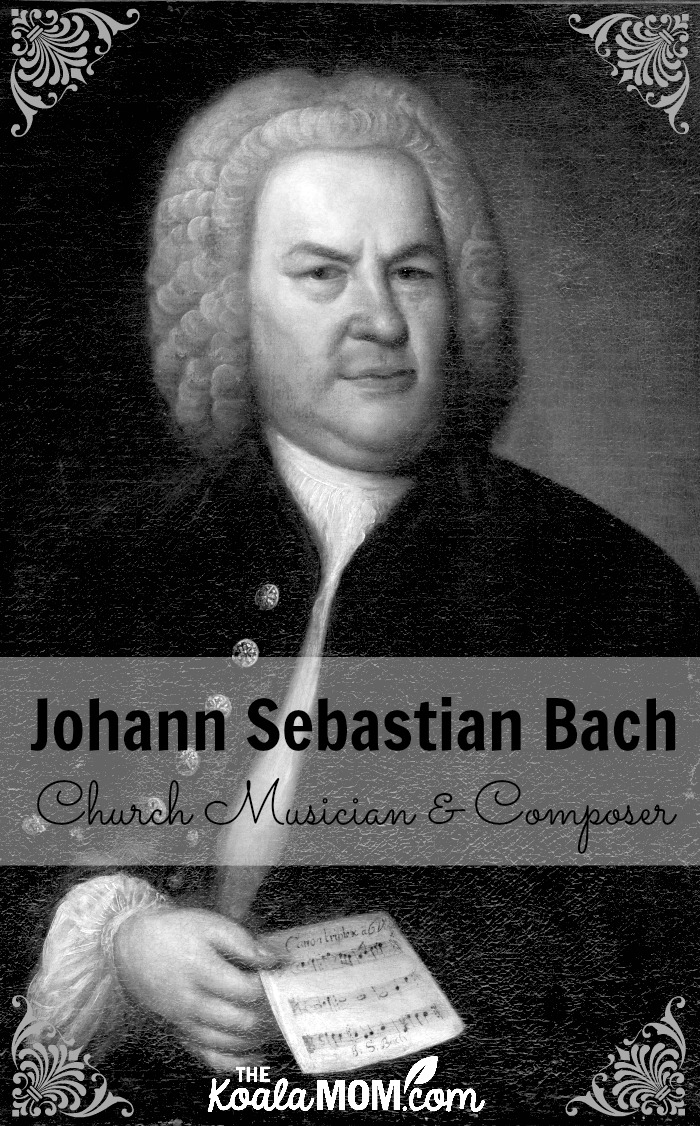When Sunshine is learning a violin piece by a composer she knows, she gets more excited about it. It’s like seeing a book by a favourite author or a painting by a favourite artist. If she knows anything about the composer, then she’ll tell her violin teacher the story. Because of this, I’ve been trying to help her learn more about the composers whose works she is playing. One of my favourites is Johann Sebastian Bach, a 17th-century Lutheran organist and composer.

This post contains affiliate links; as an Amazon associate, I earn from qualifying purchases.
The Young Johann Sebastian
Johann Sebastian Bach came from a musical family. He was born on March 31, 1685, the youngest in his family. His father was a town musician who taught him to play violin. However, Bach lost both his parents by age 10. He was then raised by his older brother Christof, a church organist. Bach had an early interest in the organ and often watched his father and brother repair and play organs.
All the men in Bach’s family were named Johann. His father was Johann Ambrosius, his brother was Johann Christoph, and two of his sons were Johann Christoph Friedrich Bach and Johann Christian Bach. They must have gone by their middle names in person.
A Musician’s Many Jobs
Pictures of Johann Sebastian Bach show a serious, stuffy man in a white wig, as per the fashion of the time. Reading Bach’s biography, however, makes me think that perhaps this composer was a bit more rebellious and independent. He changed jobs every few years, switching between working as a church musician and a court musician.
He once took an extended leave of absence from a job (without permission) to hear a famous organist play (he had to walk to and from the concert—several hundred miles each way). Another time, he was thrown in prison for taking a new job, because his previous employer didn’t want to lose him. He was also involved in a fist fight with his bassoon player, who failed to meet his high standards.
In between all his job transitions, Bach also faced personal tragedies. He married his cousin Maria when he was 21. They had seven children together before Maria died while Bach was away at work. A year and a half later, Bach remarried, to a young soprano named Anna. They had another thirteen children together. However, more than half of Bach’s children died in infancy or childhood.
Bach’s Deep Faith
Johann Sebastian Bach grew up in a staunchly Lutheran family and attended a Lutheran church. Much of his music was written for church, including his “Mass in B Minor,” “Christmas Oratorio,” and “Passion According to St. Matthew.” On his sheet music, he often wrote the initial I.N.J., for in nomine Jesu (Latin for “in the name of Jesus”). Almost three-quarters of his works are written as worship music.
When he got a copy of Luther’s translation of the Bible, Bach read it thoroughly—and marked it up. He underlined passages, corrected mistakes, and added his own notes in the margins. Near a Biblical reference to music, he wrote, “At a reverent performance of music, God is always at hand with his gracious presence.”
In his work, he went back and forth between serving at court and serving at church. However, he didn’t separate his faith from his work. His music was truly his vocation—both his job and his calling from God. Whether he was teaching, playing, or composing, it was all for God’s glory.
“Humble about his gifts, and determined that all his music was unto the Lord, we can see, as he surely did, that [his works] were all merely spiritual compositions. Without words.” ~ Rick Marschall
Bach’s Final Years
Bach began struggling with his eyesight in his fifties. He continued to work, even traveling and performing. In 1749, he attempted to have surgery done to repair his eyes. Instead, the operation left him completely blind. Soon after, he suffered a stroke. Johann Sebastian Bach died on July 28, 1750.
The Composer’s Legacy
Johann Sebastian Bach’s music was forgotten after his death. He was better known during his lifetime as an organist than a composer. Few of his works were published during his life or played in the century that followed. However, his compositions were greatly admired by future composers, including Mozart and Beethoven. Today, he is loved around the world for his beautiful music.
Bach has become known as one who could combine the rhythm of French dances, the gracefulness of Italian song, and the intricacy of German counterpoint—all in one composition. In addition, Bach could write musical equivalents of verbal ideas, such as undulating a melody to represent the sea. ~ Christianity Today
Resources about Johann Sebastian Bach for Children:
Here are some ideas for sharing Johann Sebastian Bach’s story with your children:
-
- Maestro Classics: Bach and the Pipe Organ (CD/MP3 and booklet)
- Mr. Bach Comes To Call (CD)
- What’s So Great About Bach?: A Biography of J. S. Bach Just for Kids!
- J. S. Bach (Getting to Know the World’s Greatest Composers)
- Classics for Kids (lesson plan, bio, music)

2 Comments
Bonnie, I really enjoy reading this brief but very interesting biography of Bach. It’s nice to know that through all the hardship that Bach experienced, he clung to his faith. It’s so great to see Bach is so God-loving and used his talents for to create music for God. Great job in bring Bach up in your homeschooling… you covered faith, music and history!
Lilian – thanks for dropping by! I love it when we can cover multiple school topics in one study. 🙂 And I was surprised by what I learned about J. S. Bach when I began researching. There’s definitely more to him that I expected. 🙂